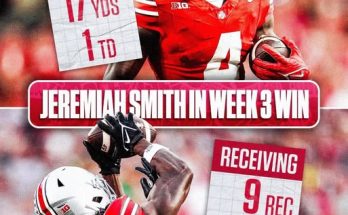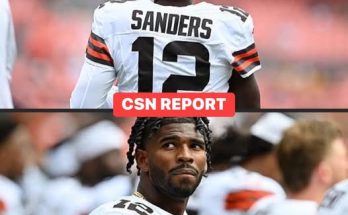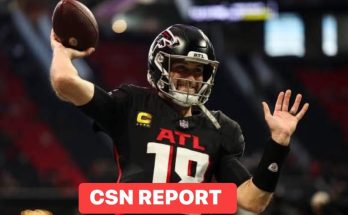UCLA’s 2025 football season has gotten off to a discouraging start, culminating in a stunning 35-10 home loss to New Mexico, a result few expected and one that has sent shockwaves through the Bruins’ fanbase. The defeat, which dropped UCLA to 0-3 on the season, was marked by inconsistent play, missed opportunities, and a quarterback performance that, while showing flashes of potential, underscored the challenges facing the team moving forward. For New Mexico, the victory was historic, as it marked the Lobos’ first-ever win against a Big Ten opponent, providing a moment of pride and momentum for the program. The game illustrated the unpredictable nature of college football, where on any given Saturday, underdogs can rewrite history and favorites can stumble in ways that demand reflection and recalibration.
At the center of UCLA’s offensive struggles was quarterback Nico Iamaleava, a highly touted recruit whose arrival was supposed to inject new energy and stability into the Bruins’ offense. The young quarterback’s performance was a mixed bag, highlighting both his capabilities and the areas that require immediate improvement. Iamaleava completed 22 of 34 passes for 217 yards, throwing one touchdown and one interception, resulting in a 64.7% completion rate. While the yardage and accuracy numbers suggest a certain level of competence, the interception and the inability to consistently sustain drives contributed significantly to UCLA’s inability to keep pace with the Lobos. On the ground, Iamaleava added six rushes for 33 yards, showcasing some mobility but not enough to change the outcome in a game that quickly slipped out of UCLA’s control. The final numbers tell a story of a quarterback who has the tools to succeed but has yet to find the rhythm and poise necessary to guide his team against resilient competition.
The game itself was a series of jarring moments for UCLA, beginning with a defense that struggled to contain New Mexico’s offense. The Lobos, often underestimated on the national stage, executed their game plan with precision and confidence, capitalizing on both turnovers and breakdowns in coverage. Each successful drive for New Mexico seemed to compound the Bruins’ frustration, as opportunities to respond were repeatedly squandered by dropped passes, missed blocks, and questionable play-calling. The result was a growing momentum for the visiting team and a mounting sense of urgency on UCLA’s sideline that, unfortunately, went unmet. The Bruins’ offensive rhythm was repeatedly interrupted, leaving the team scrambling to establish consistency, a challenge that fell heavily on Iamaleava as he navigated a defense that applied pressure at key moments and forced difficult throws.
One of the most striking aspects of the loss was the contrast between expectations and reality. UCLA, a program with a storied history and a reputation as a perennial contender, entered the game with confidence, assuming that home-field advantage and superior talent would carry them to a straightforward victory. The Lobos, meanwhile, embraced the role of underdog, playing with a freedom and intensity that allowed them to dictate the pace of the game. By the second quarter, it became evident that UCLA was struggling not just with execution, but with the mental demands of the game. Mistimed routes, miscommunications in the backfield, and defensive lapses created openings that New Mexico exploited ruthlessly. The psychological impact of falling behind early cannot be overstated, as it seemed to weigh on the Bruins’ young quarterback, limiting his ability to make decisive throws under pressure.
Despite the challenges, Iamaleava showed moments of promise. His touchdown pass highlighted his arm strength and ability to read defensive alignments, and his mobility on six rushing attempts suggested versatility that could be an asset in future games. However, the interception was emblematic of the difficulties that often accompany a quarterback adjusting to a new program and higher-level competition. Timing, chemistry with receivers, and decision-making under duress are all aspects of the game that require development, particularly for a freshman or first-year starter navigating the pressures of a nationally recognized program. These growing pains, while understandable, came at a cost, as each turnover and stalled drive added to the growing deficit and further compounded the sense of urgency that UCLA could not resolve.
Special teams and coaching decisions also played a role in the unfolding drama. While the focus often falls on quarterbacks and skill positions, missed assignments, penalties, and conservative play-calling can create a ripple effect that limits an offense’s effectiveness. In this game, the Bruins were unable to capitalize on field position, and a few untimely penalties stalled drives that might have built momentum or narrowed the score. These factors, combined with the pressure of facing an opponent eager to make history, contributed to a scenario in which UCLA could not regain control once the Lobos established dominance. Football, particularly at the collegiate level, is a team sport in every sense, and the loss highlighted areas across the roster where cohesion and execution were lacking.
New Mexico’s performance deserves recognition for its poise and execution. The Lobos demonstrated balance in their offense, mixing runs and passes effectively to keep the Bruins off guard. Their defensive scheme applied consistent pressure, forcing hurried throws and limiting UCLA’s ability to sustain long drives. Each successful possession for the Lobos reinforced the momentum that can be so critical in college football, especially when facing a program with higher expectations. The historic nature of the victory is significant not only for the players and coaching staff but for the program’s trajectory, as it can serve as a benchmark for what can be achieved with preparation, discipline, and confidence.
For UCLA, the path forward will require introspection and adjustment. A quarterback with Iamaleava’s physical gifts has the potential to lead the program effectively, but development and experience will be key. The coaching staff faces the challenge of balancing patience with accountability, ensuring that the young quarterback and surrounding offensive personnel can correct mistakes while maintaining confidence. Additionally, the team must address systemic issues that contributed to the loss, from defensive lapses to special teams errors and offensive timing. Early-season setbacks, particularly ones as jarring as this, can define a team’s narrative unless addressed with clarity and focus.
Fan reaction to the loss has been one of shock and disappointment, reflecting both the unexpected nature of the result and the emotional investment in the program. UCLA supporters are accustomed to competitive teams, and seeing their team fall short against an opponent from the Mountain West Conference underscores the unpredictability of sports. Yet, these moments can also serve as catalysts for growth, as they force players and coaches alike to confront weaknesses and implement changes that might otherwise be delayed. For Iamaleava, the experience represents an early but important lesson in resilience, decision-making, and the intensity required to succeed at a top-tier program.
As the Bruins look to the remainder of the season, the focus will inevitably turn to improvement and adaptation. The offense must find cohesion, particularly in the passing game, while the defense will need to shore up vulnerabilities exposed by New Mexico. Leadership from both veterans and younger players will be critical in stabilizing the team, as will a commitment to executing game plans under pressure. For Iamaleava, the road ahead is both challenging and promising; the performance against New Mexico may have been imperfect, but it also provided a baseline from which growth can be measured. Quarterbacks often learn more from losses than victories, and the lessons gleaned from this game could serve as a foundation for future success if approached with diligence and determination.
In reflecting on the 35-10 defeat, it is clear that UCLA is at an early crossroads in its season. The loss to New Mexico is more than just a scoreboard result; it is a reminder of the margins in college football, the unpredictability of competition, and the importance of preparation and execution at every level. While the disappointment is palpable, the opportunity to learn and adapt is equally present. For Nico Iamaleava, the journey has begun in earnest, and while the start was difficult, the path forward offers the chance to refine skills, build chemistry with teammates, and demonstrate the potential that made him a highly regarded prospect. The season may have begun with a setback, but in college football, every game is a new chapter, and UCLA will need to respond with resilience, strategy, and a renewed commitment to performance if it hopes to turn the early struggles into a narrative of growth and redemption.
The Bruins’ loss to New Mexico will linger in the minds of fans, players, and coaches alike, serving as both a cautionary tale and a motivator. It underscores the reality that no opponent should be underestimated, that preparation must match ambition, and that the integration of new talent, particularly at quarterback, requires time, patience, and deliberate coaching. The challenges are clear, but so too are the possibilities. With reflection, adjustment, and determination, UCLA has the opportunity to rebound and demonstrate the caliber of football that fans expect. For Nico Iamaleava, the experience is an early crucible, one that could ultimately shape him into the leader and playmaker that UCLA hopes he will become. The loss is a tough beginning, but beginnings are often where character and skill are forged, setting the stage for what could be a transformative season ahead.



